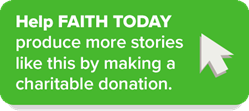An extended review of a 2025 book by April Yamasaki
Note: Our print issue contains a shorter version of this review. Faith Today welcomes your thoughts on any of our reviews. We also welcome review suggestions of other media of interest to Canadian Christians: Contact us.
Herald Press, 2025. 208 pages. $28 (ebook $21)
I had never heard the term Dearheart before and will never forget it as a result of April Yamasaki’s exploration of loss in this book. Hope Beyond Our Sorrows helps readers deal with grief through viewpoints accumulated on her journey of losing her husband – her Dearheart Gary died two years ago after 45 years of marriage – as well as her 25 years of church ministry experience.
Readers see how April, an author, editor and church liturgist in Abbotsford, B.C., and her husband served faithfully together in their parish only to have that journey cut short by cancer. From her story are a variety of lessons for a variety of people who have suffered and are suffering. Yamasaki’s insights, from someone who admittedly is still working through her latest grief, cover different wounds incurred from the absence of a loved one, the emptiness of a broken dream, the sadness of a lost quality of life and many things in between.
The book is separated into three parts. Early Grief deals with the natural seasons of reaction to bereavement. Middle Grief discusses the terrain of difficulty and complexity in the deep thickness of loss. Present Grief provides ways the reader can make strides and encounter the healing of God.
The chapters are short and followed by simple, practical and effective steps varying between breathing exercises, prayers, artistic expression, deeper community engagement and embracing gratefulness.
Woven through are the biblical stories of Jeremiah, Elijah, Ruth and others. Their stories become our stories as we are reassured of God’s care for the brokenhearted.
Yamasaki speaks of “sorjoy,” a word representing the balance between sorrow and joy that exists during the period of sadness that accompanies mourning, be it the death of a spouse, child, friend, mentor or the death of an aspiration or dream.
This book helped me reflect on the loss of my father. It helped that it was both descriptive and prescriptive. It was descriptive in its message that bereavement is not linear. It has ebbs and flows which depend on the depth of the loss as well as one’s proclivity to actively process that loss. Its effects can still reverberate several years after the initial trauma and in unexpected ways. For me, this makes the book a valuable resource, because it can be picked up and used as a topical guide for what may ail one’s soul at a given time. It is also important because the reader is released from examining their grief from a point of view where they are judging their health based on a model of recovery that is offered as opposed to acknowledging that moving through loss is often unpredictable with the only constant being a desire to find God’s help in the erratic patterns that present themselves.

This leads to the book’s prescriptive nature where Yamasaki, with great care and a holistic approach, suggests various means that one can work at identifying where God is in these dark times. She is aware of the reader’s need for outside help in given situations – for example when there is a threat of harm to self or others – and proposes the assistance of clergy, professional counsellors, family and friends to lend a hand when needed. The “hope practices” at the end of each chapter provide means to walk through the sadness of grief.
I plan to have this book nearby to help me through the times which still come, even though my father’s passing was over a decade ago, where I have my own questions, longings and hurts. I will also recommend this book as a worthy balm to other people in my life who would walk through the crucible that loss brings.
It’s not an exhaustive catch-all, but for those who can relate to Yamasaki’s story or allow themselves to be touched by her thoughtfulness, it will most definitely steer them into the best direction, allowing their path to become increasingly filled with hope and their wounds to become less painful as each day passes.
Editor's note: We love our reviewers, but we don’t always agree. You won’t either, maybe especially in the Bestsellers and Roundup sections. Do let us know what you think. Sample chapters of most books can be viewed at Books.Google.ca and Amazon.ca. Faith Today earns a small commission when people make purchases using our links to Amazon.ca.